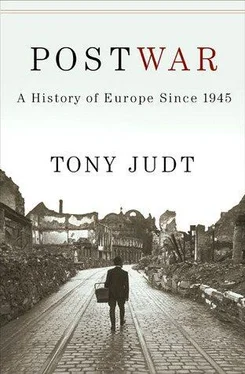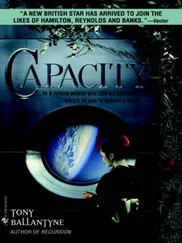The burnished image of wartime Holland—where almost everyone was believed to have ‘resisted’ and done their best to impede German plans—was engaged and discredited somewhat earlier, and by local initiative. By the mid-Sixties multi-volume official histories of the Second World War provided copious information about the what of the Netherlands’ wartime experience, including the deportations, but studiously avoided addressing in detail the who , the how and the why of the Jewish catastrophe in particular. In any case, few people read them. But in April 1965 a Dutch historian—Jacob Presser—published Ondergang , the first full history of the extermination of Dutch Jewry; it sold 100,000 copies in 1965 alone and precipitated a torrent of public interest in its subject. [423]It was followed in short order by an avalanche of television documentaries and other programmes about the wartime occupation—one of which, De bezetting (‘The Occupation’), was to run for over two decades—and by a shift in official mood. It was in 1965 that a Dutch government, for the first time, offered to contribute to the memorial at Auschwitz—though it took another seven years before the Netherlands at last agreed to pay to surviving Jewish deportees the pension that had been accorded resisters and other Nazi victims since 1947.
As in Germany, the trigger for Dutch interest in their occluded past was the Israeli and German trials of the early Sixties. And in the Netherlands as elsewhere, the post-war baby-boomers were curious about recent history and more than a little skeptical of the story they had been told—or, rather, not told—by the ‘silent generation’ of their parents. The social changes of the Sixties helped breach the wall of official silence about the occupation: the breaking of social and sexual taboos—which in parts of the Netherlands, notably Amsterdam, had deeply disruptive implications for a hitherto conservative society—drew in its train a suspicion of other received practices and cultural truisms. For a new cohort of readers the core-text of the Dutch Holocaust—Anne Frank’s diary—was now read in a very different light: Anne and her family, after all, were betrayed to the Germans by their Dutch neighbours.
By the end of the century, the years 1940-45 had become the most thoroughly studied period in Dutch history But although the truth about the contribution of the Dutch to the identification, arrest, deportation and death of their Jewish fellow citizens first became public knowledge in the Sixties, it took a long time for the full implications to sink in: not until 1995 did a reigning head of state—Queen Beatrice—publicly acknowledge the tragedy of the Dutch Jews, in the course of a visit to Israel. Perhaps only in the mid-Nineties, with the image of armed Dutch UN peacekeepers standing placidly aside to let Serbian militia round-up and murder seven thousand Muslims at Srebrenica, did the lesson finally strike home. A long-postponed national debate about the price the Dutch have paid for their heritage of order, co-operation and obedience could at last begin.
In their defense, the Dutch—like the Belgians, the Norwegians, the Italians (after September 1943) and most of occupied eastern Europe—could claim that however shameful the cooperation of individual bureaucrats, policemen and others with the occupying authorities, the initiative always came from above: from the Germans. This is not as true as was once believed, and in certain places—notably territories like Slovakia or Croatia (or Hungary in the final months of the war) where local puppet governments pursued criminal projects of their own—it was only ever a half-truth. But in occupied western Europe, with one outstanding exception, there were no popularly accredited local regimes, no ostensibly legitimate national governments exercising authority and thus fully responsible for their actions. The Germans could not have done what they did in occupied Norway or Belgium or Holland without the collaboration of the locals (in the one country—Denmark—where that collaboration was not forthcoming, the Jews survived). But in all these cases it was the Germans who issued the orders.
The exception, of course, is France. And it is the tortured, long-denied and serially incomplete memory of France’s war—of the Vichy regime and its complicitous, pro-active role in Nazi projects, above all the Final Solution—that has back-shadowed all of Europe’s post-war efforts to come to terms with World War Two and the Holocaust. It is not that France behaved the worst. It is that France mattered most. Until 1989, Paris—for reasons discussed in this book—was still the intellectual and cultural capital of Europe: perhaps more so than at any time since the Second Empire. France was also by far the most influential state in continental western Europe, thanks to Charles De Gaulle’s remarkable achievement in re-establishing his country in the corridors of international power. And it was France—French statesmen, French institutions and French interests—that drove forward, on French terms, the project for a united continent. Until France could look its past in the face, a shadow would hang over the new Europe—the shadow of a lie.
The Vichy problem can be simply stated. Marshall Pétain’s regime had been voted into office in July 1940 by the last parliament of France’s Third Republic; it was thus the only wartime regime that could claim some continuity, however spurious, with pre-war democratic institutions. At least until the end of 1942, an overwhelming majority of French men and women regarded Vichy and its institutions as the legitimate authority in France. And for the Germans, Vichy was an immense convenience—it saved them the trouble of installing a costly occupation regime of their own in so large a country as France, while furnishing them with everything they needed from such a regime: acquiescence in defeat, ‘war reparations’, raw materials, cheap labor… and much else besides.
For Vichy did more than accommodate itself and its subjects to France’s defeat and run their country for Germany’s convenience. Under Pétain and his Prime Minister, Pierre Laval, France initiated collaborative projects of its own: notoriously the introduction in 1940 and 1941 of ‘Jewish laws’ without any German pressure to do so, and the arrangement whereby French authorities themselves would round up the country’s Jewish population (beginning with the many foreign-born Jews resident there) to meet quotas being demanded by the Nazi authorities as the Final Solution got under way. As a consequence of this successful assertion of French administrative autonomy, most of the Jewish deportees from France never even saw a foreign uniform until they were handed over to Germans for final trans-shipment to Auschwitz from the train yards at Drancy (north of Paris). Until then the whole affair was in French hands.
Following the Liberation, for all the obloquy poured upon Pétain and his collaborators, his regime’s contribution to the Holocaust was hardly ever invoked, and certainly not by the post-war French authorities themselves. It was not just that the French successfully corralled ‘Vichy’ into a corner of national memory and then mothballed it. They simply didn’t make the link between Vichy and Auschwitz. Vichy had betrayed France. Collaborators had committed treason and war crimes. But ‘crimes against humanity’ were not part of the French juridical lexicon. They were the affair of Germans.
This situation still obtained twenty years later. When the present author studied French history in the UK in the late Sixties the scholarly literature on Vichy France—such as it was—paid almost no attention to the ‘Jewish’ dimension. ‘Vichy studies’ in France and elsewhere focused on the question of whether the Pétainist regime was ‘Fascist’ or ‘reactionary’, and how far it represented continuity or a break with the country’s republican past. There was still a respected school of French historians who argued that the Pétainist ‘shield’ had protected France from ‘Polonisation’—as though Hitler ever intended to treat his western conquests with the barbarous ferocity visited upon the East. And any questioning of the myth of a heroic, nationwide resistance was still off limits—in historiography as in national life.
Читать дальше












